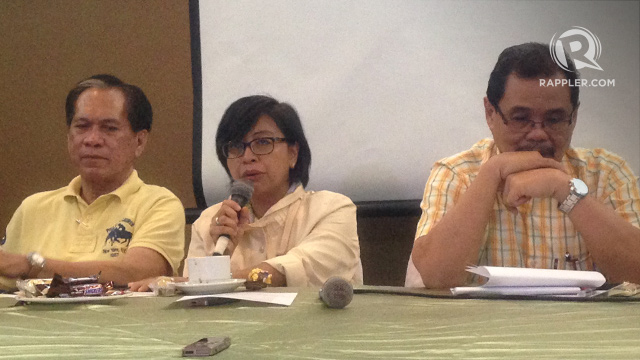SUMMARY
This is AI generated summarization, which may have errors. For context, always refer to the full article.

MANILA, Philippines (UPDATED) – Mark the date: August 18.
Peace panels of the government and the Moro Islamic Liberation Front (MILF) failed once again to finish the final draft of the law creating a new autonomous government in Mindanao after a 10-day meeting in Davao City that ended Sunday, August 10.
Both sides, however, agreed to submit the much-awaited measure to President Benigno Aquino III on August 18, a Monday.
In a joint statement, the panels said “they have reached agreement on substantial portions of the document and have developed a shared understanding of the remaining challenges and unsettled issues, which they will bring back to their principals for further guidance.”
The crafting of the law is the next phase of the historic peace agreement signed between the government and the MILF in March that will require the rebel group to decommission their arms and troops in specific timeframes as political commitments towards the creation of a new autonomous region in Mindanao are fulfilled.
Discussions during the Davao workshop focused on issues involving fiscal autonomy and administration of justice in the proposed Bangsamoro political entity, the panels said.
Under the final peace agreement, the Bangsamoro political entity replacing the Autonomous Region in Muslim Mindanao (ARMM) is envisioned to enjoy greater fiscal and political powers.
The new autonomous government will be parliamentary in form and is designed to get block grants from Congress, which means that it will get automatic appropriations each year based on a formula that will be outlined in the proposed law.
Before this new government can be put in place, however, the Bangsamoro Basic Law must first be approved in Congress and passed in a subsequent plebiscite.
The peace process reached a hitch after the MILF accused Malacañang of watering down the draft Bangsamoro law submitted by the Bangsamoro Transition Commission (BTC) for review before its submission to Congress. (READ: MILF still unhappy with draft law)
Since it started negotiating for a political settlement with the government, the MILF has long believed that the Constitution needs to be amended to ensure genuine autonomy in Mindanao. The Aquino administration, meanwhile, believes the final peace agreement can be implemented within the “flexibilities” of the Constitution.
After Malacañang returned the draft law to the BTC, commissioners decided to elevate the matter to the peace panels.
Shortly after the draft law was returned, Aquino also met MILF chairman Al Haj Murad Ebrahim in Hiroshima, Japan, in a surprise meeting. It was also a surprise meeting between the two principals that served as a turning point in peace negotiations with the rebel group under the Aquino administration back in 2011.
A series of discussions between the panels have been held in Kuala Lumpur, Manila and the latest, in Davao, in an attempt to bridge the gap between the BTC and Malacañang versions of the proposed law.
Executive Secretary Paquito Ochoa and ARMM governor Mujiv Hataman were seen at the venue of the Davao meeting but both peace panels refused to confirm if they have met with Ochoa.
Meanwhile, Malaysian facilitator Tengku Ghafar personally witnessed the culmination of the last day of the discussions.
‘Only way to go is forward’
Amid delays in arriving at a “mutually agreeable” draft law, MILF chief negotiator Mohagher Iqbal sought to assure the public that the situation on the ground remains stable.
In a joint press conference in Davao after the meeting, Iqbal told reporters that the MILF leadership is in control of the situation.
Iqbal: Command control of MILF is effective. Dialogue among them is ongoing. No big problems with the members right now. #Bangsamoro
— Bangsamoro Trans Com (@BangsamoroTC) August 10, 2014Government chief negotiator, Miriam Coronel-Ferrer for her part said that there is no way to go but forward.
Chair Ferrer: The deadline expresses our common sense of urgency to finish. We are not going to make it (cont) http://t.co/KON6Q2FbWP
— OPAPP (@OPAPP_peace)August 10, 2014 While the peace process between the government and the MILF moves, other armed groups in Mindanao continue to exist. One such group is the Bangsamoro Islamic Freedom Fighters (BIFF) movement, a breakaway faction of the MILF that has continued to reject the final peace agreement.
Meanwhile, MILF’s rival group, the Moro National Liberation Front (MNLF), also opposes the Comprehensive Agreement on the Bangsamoro. For the MNLF, the government has yet to fully implement the final peace pact it signed with the government in 1996.
The varying positions between the MILF and the MNLF have prompted the powerful Organization of Islamic Cooperation to call on the two groups to take steps towards creating a united front.
The ongoing series of discussions between the panels also comes at the backdrop of a spate of violence in Sulu allegedly perpetrated by terrorist group Abu Sayyaf that has claimed the lives of 23 civilians.
Lawmakers await draft law
Despite the delays in the submission of the Bangsamoro bill, Senate and House leaders have affirmed their commitment to try their best to pass the measure by the end of 2014.
The House of Representatives is set to organize a “supercommittee” comprising of all concerned committees once the bill is submitted to Congress to speed up deliberations.
Some lawmakers have proposed conducting daily hearings to beat the deadline.
Once the proposed law goes to Congress, lawmakers are free to make further changes to the measure. – with reports from Karlos Manlupig/Rappler.com
Add a comment
How does this make you feel?
There are no comments yet. Add your comment to start the conversation.